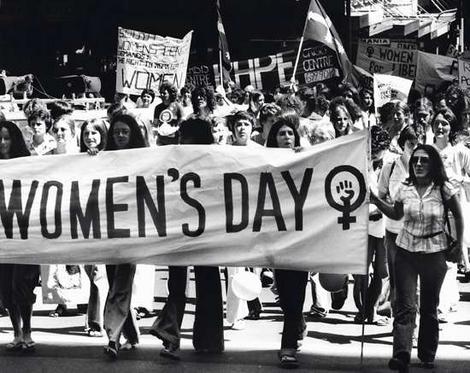 In a recent Atlantic article "Why Women Still Can't Have it All", Anne-Marie Slaughter, newly departed from the Department of State and returning to her tenured job at Princeton writes: “Women of my generation have clung to the feminist credo we were raised with, even as our ranks have been steadily thinned by irresolvable tensions between family and career, because we are determined not to drop the flag for the next generation. But when many members of the younger generation have stopped listening, on the grounds that glibly repeating ‘you can have it all’ is simply airbrushing reality, it is time to talk.”
Really, really?? Where did Ms. Slaughter imbibe this so-called feminist credo? Not in any women's studies class I taught during my thirty-year career. Or was she asleep during those parts of the lectures and discussions distinguishing "careerism" masquerading as feminism from feminism as a social movement pushing for changing social structures. The feminists I knew were arguing for a world where NEITHER men nor women would have to choose between family and work; we wanted to alter our mad consumerist society's penchant for "having it all".
In a recent Atlantic article "Why Women Still Can't Have it All", Anne-Marie Slaughter, newly departed from the Department of State and returning to her tenured job at Princeton writes: “Women of my generation have clung to the feminist credo we were raised with, even as our ranks have been steadily thinned by irresolvable tensions between family and career, because we are determined not to drop the flag for the next generation. But when many members of the younger generation have stopped listening, on the grounds that glibly repeating ‘you can have it all’ is simply airbrushing reality, it is time to talk.”
Really, really?? Where did Ms. Slaughter imbibe this so-called feminist credo? Not in any women's studies class I taught during my thirty-year career. Or was she asleep during those parts of the lectures and discussions distinguishing "careerism" masquerading as feminism from feminism as a social movement pushing for changing social structures. The feminists I knew were arguing for a world where NEITHER men nor women would have to choose between family and work; we wanted to alter our mad consumerist society's penchant for "having it all".
Slaughter claims that "the pioneer generation of feminists walled off their personal lives from their professional personas." Unfortunately, her examples are drawn from “women climbing the legal hierarchy in New York law firms” in the 1980s. That may have been the culture in those settings—and still is. But during that same time, feminists like me were writing critiques of this “time macho” culture. Awareness and acknowledgment of those critiques constitutes a major research blind spot in Slaughter’s slaughtering of feminism tout court.
How long ago it was that Arlie Hochschild’s essay “Inside the Clockwork of Male Careers” appeared. In that 1975 essay Hochschild called not only for women to stop accepting male behavior as the default standard, but for men and women together to reflect on the kind of society we were building. She challenged the assumption that the “best society” was one where intimacy and a more genuine public life both were sacrificed on the altar of productivity measured in corporatist terms. Slaughter’s essay, and its accompanying mantra that feminists sold women the fiction that they could “have it all,” ignores the real social history of feminism—it was always a wider movement than one represented by the individualist demands of professional women for better career opportunities for themselves. But this is too a complicated fact for Slaughter to consider; it wouldn’t draw as much publicity as an article blaming feminists (again) for hoodwinking women into “choosing” a male-modeled career that runs roughshod over women’s desire for balance in our lives. Had she studied the real history of feminism she would have had to modify her concluding remarks that “now is the time to revisit the assumption that women must rush to adapt to the ‘man’s world’ that our mothers and mentors warned us about” to read: “now AGAIN is the time to revisit the assumption that women must rush to adapt to the ‘man’s world’ that feminists warned was a trap that neither men nor women should have to endure.”
Yet, equally important as noting these mistakes in recounting what feminism was about, I wonder what effect Slaughter’s essay can possibly have to improve the lives of women who, unlike her, don’t have a tenured job at Princeton with flexible hours and summers off to allow them to attend their children’s baseball games. Slaughter claims to recognize these more
economically disadvantaged women’s issues—they may not be able to demand flex-time schedules without losing their jobs. But while she nods in their direction, she offers little solace besides citations that firms announcing “family-friendly” policies have seen their share prices rise. Cold comfort for the women at Walmart is to be found in her caveat that “we may need to put a woman in the White House before we are able to change the conditions of women working at Walmart.”
In the end, Slaughter’s “pursuit of happiness” in returning to the “simple pleasures of parenting” will remain a fleeting mirage for the millions of women and men struggling long hours at unsatisfying jobs (not careers) just to put food on a yard sale table in the small rental unit they’ve downsized to, now that their home has been foreclosed. While she’s attending her children’s piano recitals and finishing her next academic book, will Slaughter even be thinking of them? Does she have any leadership pearls to share among the brigade of part-time workers, women and men, who toil long hours at two different jobs without benefit of health insurance or extended vacation time, advising them how to bring flexi-time PLUS adequate pay to their work worlds? Unfortunately, I doubt they’ll be in the audience when she gives her next speech at Vassar.
Still, if Slaughter were to venture and give a talk about work-life balance at one of the vast strip malls increasingly dotting the American landscape, she just might re-ignite the feminist revolution those of us in the “pioneering” generation, like myself, envisioned. (And, by the way, its banner cry was not “You can have it all!”) That is, if her talk includes any ideas for how to address what Susan Sontag once called the “immediate plight of women [and men].”
Slaughter rightly contends that seeking a balanced life is “not a women’s issue.” But neither is it an “individual issue.” It’s a political issue that demands concerted effort on all our parts to change the way we organize society, what we decide to produce and consume and how, and what core human values we choose to include in our measures of “success”. But that requires changing our priorities both nationally and globally and beginning to address seriously and with an expanded imagination a scope of concerns much wider than whether one gets home in time to share supper around the family hearth.
